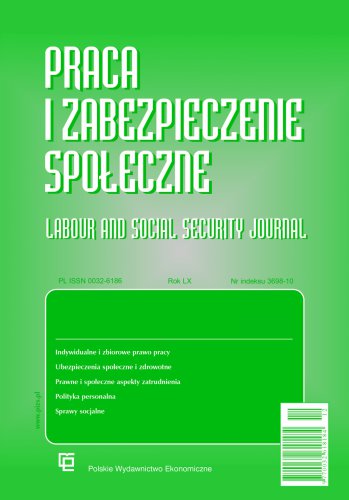Labour law in the era of climate transformation
Prawo pracy w dobie transformacji klimatycznej
Progressing unfavourable climate change — rising temperatures, changing precipitation patterns, melting glaciers and snow, rising average global sea level, is a reality. To mitigate climate change, emissions must be reduced or prevented. Certain workplaces and industries will undergo changes or disappear altogether as a result of climate change, while others will come into being as we move towards 'greener' economies. Labour law, although not a natural ally in the fight against global warming, can become a very strong partner for environmental law. The Authors point to the obligations of the parties to the employment relationship, which should be reinterpreted to become an effective instrument in this fight. Thus, they start a discussion on the role of labour law in combating climate change.
Postępujące niekorzystne zmiany klimatu — wzrost temperatury, zmiany w strukturze opadów, topnienie lodowców i śniegu, podnoszenie się średniego poziomu mórz na świecie — są faktem. Aby złagodzić zmiany klimatu, należy ograniczyć te emisje lub im zapobiegać. Niektóre miejsca pracy i gałęzie przemysłu ulegną zmianom lub całkowicie znikną w wyniku zmian klimatu, podczas gdy inne powstaną w miarę przechodzenia do bardziej ekologicznych gospodarek. Prawo pracy, mimo że nie jest naturalnym sprzymierzeńcem walki z ociepleniem klimatu, może stać się bardzo silnym partnerem dla prawa ochrony środowiska. Autorzy wskazują na obowiązki stron stosunku pracy, które powinny ulec reinterpretacji, aby stały się skutecznym instrumentem w tej walce. Tym samym rozpoczynają dyskusję o roli prawa pracy w przeciwdziałaniu zmianom klimatycznym.
Bibliografia
References/Bibliografia
Aminzadeh, S. C. (2007). A Moral Imperative: The Human Rights Implications of Climate Change. Hastings International and Comparative Law Review, 30(2).
van den Berge, J. (2010). Employment opportunities from climate change mitigation policies in the Netherlands. International Journal of Labour Research, (2). https://doi.org/10.5848/ILO.978-9-221254-79-9_5
Brown, O. (2008. Migration and Climate Change. IOM Migration Research Series. https://doi.org/10.18356/26de4416-en
Ciechanowicz-McLean, J. (2011). Prawnoekonomiczne aspekty zmian klimatu. In I. Grochowska, & L. Karski (Eds.), Zmiany klimatu a społeczeństwo. C.H.Beck.
Clement,V., Rigaud, K .K., de Sherbinin, A., Jones, B., Adamo, S., Schewe, J., Sadiq, N., & Shabahat, E. (2021). Groundswell Part 2: Acting on Internal Climate Migration. World Bank. https://doi.org/10.1596/36248
Conaghan, J., Fischl, R. M., & Klare, K. (2004). Labour Law in an Era of Globalization: Transformative Practices and Possibilities. Oxford University Press. https://doi.org/10.1093/acprof:oso/9780199271818.001.0001
Doorey, D. J. (2016). A Law of Just Transitions?: Putting Labor Law to Work on Climate Change. Osgoode Legal Studies Research Paper Series, (164). https://doi.org/10.2139/ssrn.2680241
EEA (2019. The European environment — state and outlook 2020. Knowledge for transition to a sustainable Europe. https://www.eea.europa.eu/soer/publications/soer-2020 (accessed: 10.02.2022).
Esteban, M., Leary, D., Zhang, Q., Utama, A., Tezuka, T., & Ishihara, K. N. (2011). Job retention in the British offshore sector through greening of the North Sea energy industry. Energy Policy, 39(3). https://doi.org/10.1016/j.enpol.2010.12.028
Haber, J. (1981). Bezpieczeństwo jako determinanta stosunkow międzynarodowych. In Determinanty polityki zagranicznej i międzynarodowej. Warszawa.
Hepple, B., & Veneziani, B. (2009). The Transformation of Labour Law in Europe: A Comparative Study of 15 Countries 1945–2004. Bloomsbury Publishing.
Huq, N., & Huge, J. (2010). Workers' rights in climate change policies: The case of adaptation programmes in Small Island Developing States. International Journal of Labour Research, (2).
ILO, UNEP, ITUC, IOE (2008). Green Jobs: Towards Decent work in a Sustainable. LowCarbon World. https://www.ilo.org/global/topics/green-jobs/publications/WCMS_158727/lang--en/index.htm (accessed: 10.02.2022).
ILO (2018). The employment impact of climate change adaptation Input Document for the G20 Climate Sustainability Working Group. https://www.argentina.gob.ar/sites/default/files/ilo_-_the_employment_impact_of_climate_change_adaptation.pdf (accessed: 10.02.2022).
ILO (2019). Centenary Declaration for the Future of Work. https://www.ilo.org/wcmsp5/groups/public/@ed_norm/@relconf/documents/meetingdocument/wcms_711674.pdf (accessed: 10.02.2022).
IPCC (2021). Climate Change 2021: The Physical Science Basis. Contribution of Working Group I to the Sixth Assessment Report of the Intergovernmental Panel on Climate Change. https://www.ipcc.ch/report/ar6/wg1/ (accessed: 10.02.2022).
Kundzewicz, Z. W., Hov, Ø., & Okruszko, T. (Red.). (2017). Zmiany klimatu i ich wpływ na wybrane sektory w Polsce. Poznań.
Markkanen, S., & Anger-Kraavi, A. (2019). Social impacts of climate change mitigation policies and their implications for inequality. Climate Policy, 19(7). https://doi.org/10.1080/14693062.2019.1596873
Meza, L. E. R. (2010). Climate change, poverty and migration processes in Chiapas, Mexico. International Journal of Labour Research, (2). https://doi.org/10.5848/ILO.978-9-221254-79-9_4
Nakičenovič, N., & Swart, R. (Eds.) (2000). Emissions Scenarios. Special Report of Working Group III of the Intergovernmental Panel on Climate Change. Cambridge.
Primack, R. B, Ellwood, E. R., Gallinat, A. S., & Miller-Rushing, A. J. (2021). The growing and vital role of botanical gardens in climate change research. New Phytologist, 231(3). https://doi.org/10.1111/nph.17410
Stern, N. (2007). The Economics of Climate Change: The Stern Review. Cambridge. https://doi.org/10.1017/CBO9780511817434
Schroter, D., Cramer, W., Leemans, R. et al. (2005). Ecosystem Service Supply and Vulnerability to Global Change in Europe. Science, 310(5752). https://doi.org/10.1126/science.1115233
Tol, R .S. J. (2009). The Economic Effects of Climate Change. Journal of Economic Perspectives, 23(2). https://doi.org/10.1257/jep.23.2.29
Working on a warmer planet. (2019). The impact of heat stress on labour productivity and decent work. International Labour Office. https://www.ilo.org/global/publications/books/WCMS_711919/lang--en/index.htm (accessed: 10.02.2022).
Zębek, E. (2020). Human — environment relations in the ecological and legal contexts. In R. Gorecki (Ed.), Human and the environment. Olsztyn.
Zbucka-Gargas, M, Jannotti da Rocha, C., & Jevaux, G. A. (2022). Telework and its fundamentalism in contemporary society: incipient ideas about the green labor contract as the epicentral matrix of climate justice. Praca i Zabezpieczenie Społeczne, (2). https://doi.org/10.33226/0032-6186.2022.7.6

